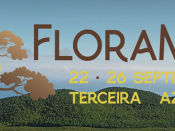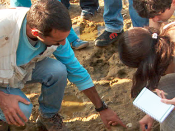Por Duarte Figueiredo (Max Planck Institute of Molecular Plant Physiology).
Seed formation in flowering plants starts with a double fertilization event where two paternal sperm cells fertilize the two maternal gametes, egg cell and central cell. This event leads to the formation of two fertilization products: the embryo, which forms the next generation; and the endosperm, which nourishes the embryo. These two structures are surrounded by a tissue of maternal sporophytic origin called the seed coat. In order for the seed to form, embryo, endosperm and seed coat have to communicate with each other and coordinate their development. In our lab we are interested in the mechanisms leading to the formation of the endosperm and of the seed coat, and how these two structures communicate with each other. Before fertilization, seed development is blocked by the Polycomb Repressive Complex 2 (PRC2), which deposits repressive H3K27me3 epigenetic marks. In the model species Arabidopsis thaliana, we showed that post-fertilization production of the phytohormone auxin lifts the PRC2 block and allows for the seed to start developing. Auxin is produced in the endosperm and is transported to the seed coat, in order to drive its development. Now, we know that a second class of phytohormones, brassinosteroids (BRs), are also important for seed coat and endosperm development. BRs are necessary for proper removal of H3K27me3 marks from the seed coat, and they non-cell autonomously control the development of the endosperm. So we now propose a model where auxin produced in the endosperm and BRs produced in the seed coat ensure growth coordination between these two stuctures. While these experiments were done in Arabidopsis, we are now testing if these mechanisms of seed initiation are conserved throughout the phylogeny. Indeed, our data indicates that seed initiation is linked to auxin production already in early diverging angiosperms, and likely even in gymnosperms. With this work, we aim to provide a framework to understand the mechanisms necessary to form a seed, which can be potentially exploited for crop improvement in the future.
Transmissão via Zoom.






